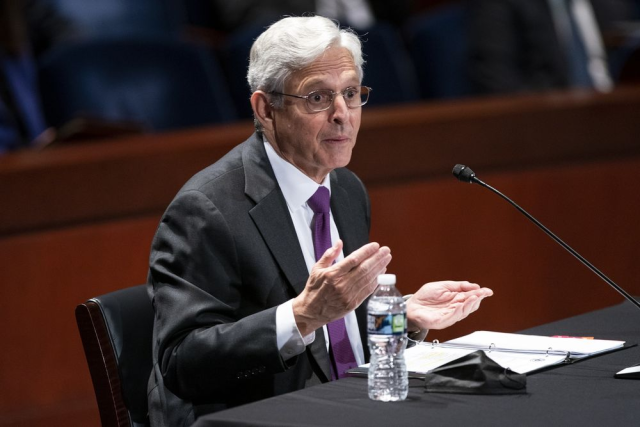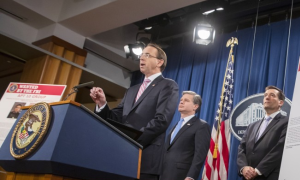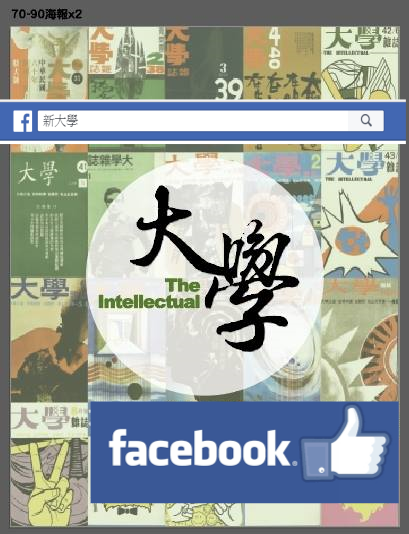♦ 本文轉載自 Bloomberg。若有侵害著作權,請速告知,我們將盡速移除 ♦
2021/10/27
-
‘China Initiative’ under Trump produced cases that fell short
-
Garland pledges allegations won’t be ‘based on discrimination’

Merrick Garland speaks during a House Judiciary Committee hearing in Washington, D.C. on Oct. 21. Photographer: Greg Nash/The Hill/Bloomberg
The Trump administration went all-in on what it called its “China Initiative,” with the Justice Department prosecuting Chinese and Chinese-American researchers it said were stealing U.S. secrets while hiding their links to the government in Beijing and the People’s Liberation Army.
Now, after a number of those cases fizzled in court and amid growing criticism that the initiative leads to discrimination against Asian-Americans, Justice Department leadership under Attorney General Merrick Garland is moving more cautiously.
“There’s no excuse for this kind of discrimination, and it’s the obligation of the Justice Department to protect people,” Garland said during a hearing last week before the House Judiciary Committee. “I can assure you that cases will not be pursued based on discrimination, but only on facts justifying them.”
Department officials are now moving to increase oversight of cases being developed by FBI field offices and U.S. attorneys across the country while requiring greater consultation on the front end of investigations, and they plan a comprehensive review of all current cases.
Garland, who must balance reining in abuses without appearing soft on China’s illegal activity in the U.S., was asked about the issue when he appeared Wednesday for an oversight hearing by the Senate Judiciary Committee.
“We regard the People’s Republic of China as an extraordinarily serious and aggressive threat,” Garland said. “Every case is evaluated on its own with respect to the law and the facts. We continue to open cases about the People’s Republic of China daily.”
The China Initiative began in 2018 under President Donald Trump to counter China’s theft of trade secrets and technology. It came as part of a broad attack on China’s influence in the U.S. Trump’s Attorney General William Barr accused companies such as the Walt Disney Co. and Apple Inc. of serving as pawns for China by giving in to its demands, and his Secretary of State Michael Pompeo said Chinese spying was aided by colleges “hooked on communist cash.”
In one of the more tense episodes, the U.S. charged four Chinese researchers in July 2020 for allegedly concealing their ties to China’s military and ordered Beijing to shut its consulate in Houston.
One of the researchers took shelter in China’s consulate in San Francisco, creating a dramatic standoff as federal prosecutors declared her a fugitive before she was eventually taken into custody. But after a year of languishing in court, the Justice Department moved to dismiss the cases in July of this year, saying only that recent developments prompted officials to re-evaluate the prosecutions.
Other cases also have fallen apart in court. The failures have contributed to criticism that the China Initiative leads to false allegations against Chinese nationals in the U.S. and Asian-Americans. Almost 100 lawmakers asked the department in July to investigate “the repeated, wrongful targeting of individuals of Asian descent for alleged espionage.”
Critics are hailing the potential for meaningful changes to the program under Garland, but they want the department to go further.
“We think there should be a moratorium on the China Initiative,” said John Yang, president and executive director of Asian Americans Advancing Justice--AAJC. “As demonstrated by the cases that have been filed, the majority of the cases have not involved economic espionage or trade secret theft. And so to have a label on this initiative really causes harm to our Asian American community.”
Some Justice officials have discussed the idea of offering an amnesty or leniency program for those who come forward and admit wrongdoing as an alternative to prosecutions under the China Initiative. For now, though, that effort appears to have stalled.
Eight Republican senators sent Garland a letter in May opposing any amnesty.
“The United States must also take reasonable steps to protect taxpayer-funded research from theft, diversion and ultimately weaponization against our own long-term national interests,” according to the letter, which was signed by GOP members of the Senate Judiciary panel, including its top Republican, Chuck Grassley of Iowa.
Strategy Review
The future of the China Initiative may not be settled until President Joe Biden’s administration completes its review of strategy toward China.
For now, the Justice Department is continuing the project. FBI Director Christopher Wray told lawmakers earlier this year that the bureau opens a new case related to China every 10 to 12 hours, and has more than 2,000 investigations tied to the Chinese government.
Only a handful of cases against researchers result in prosecutions, however. The FBI declined to say how many cases have been closed. Since 2018, the department has brought 12 prosecutions related to academic and research integrity and won convictions against four individuals, according to agency statistics.
Current and former law enforcement officials say the department is committed to countering illegal and nefarious activity by the Chinese government. The efforts are focused on particular activities by China and individuals who are concealing their affiliation with that country’s government, not Chinese citizens or Asian-Americans in general, according to the officials, who asked not to be identified.
Garland said the department will review all activities under the national security division and decide which ones go forward once Biden’s nominee to lead it, Matthew Olsen, is confirmed by the Senate. The Senate may vote to confirm Olsen this week.
Garland also said he plans to implement implicit bias training for department employees. He cited a memo he issued in March directing employees to give priority to investigating and prosecuting hate crimes and incidents, especially an outbreak of attacks against Asian-Americans during the Covid-19 pandemic.
The move toward increased oversight recognizes that local FBI field agents and line prosecutors sometimes pursue cases as criminal matters when it’s not justified, or when other options are available, according to two former officials. They don’t always think about the broader implications of the cases on U.S.-China relations, or how damaging it can be to the department if cases collapse in court, the officials said.
Still, the department cites several success stories under the China Initiative, saying about 80% of all economic espionage prosecutions allege conduct that would benefit the Chinese government, and about 60% of all trade secret theft cases have some link to China.
For example, a university researcher in Ohio was sentenced to prison in May for making false statements to federal agents to conceal the use of grant funding to help develop China’s expertise in rheumatology and immunology.
The FBI said its investigations must be conducted in accordance with department policies.
“This authority is based on the illegal activity, not on any constitutionally protected activity or the individual’s race, ethnicity, national origin or religious affiliation,” the FBI said in a statement. “The FBI is methodical and thorough in its investigations. We take the necessary and appropriate steps to investigate all aspects of an allegation to prove or disprove the elements of the federal violation suspected.”
(文章提供:白先慎)
♦ 專文屬作者個人意見,文責歸屬作者,本報提供意見交流平台,不代









